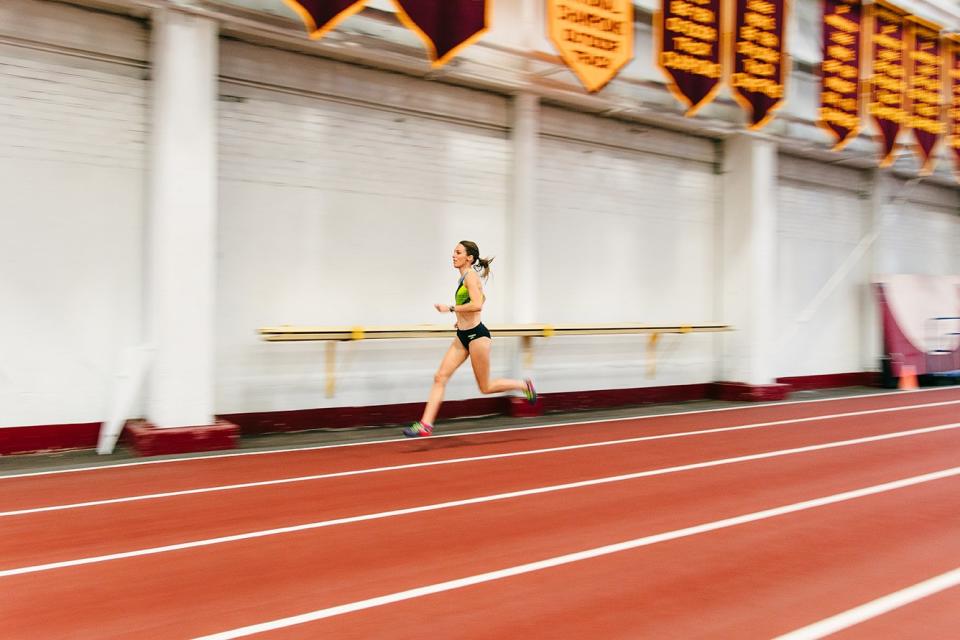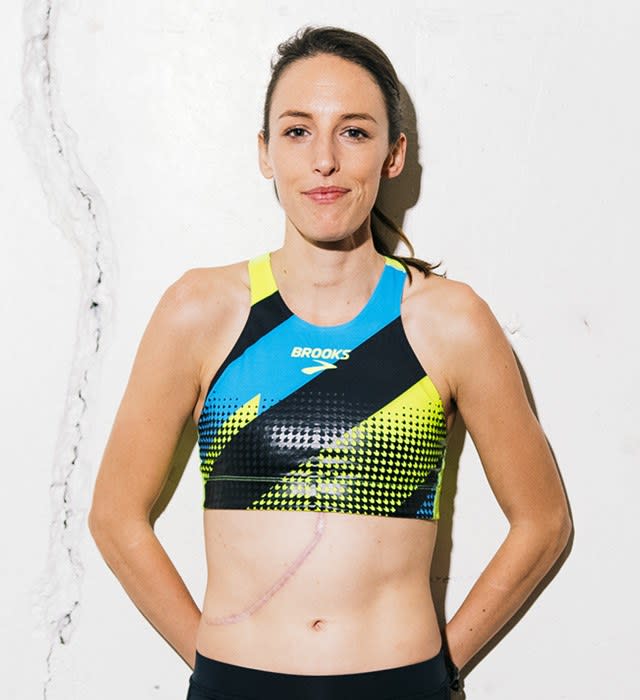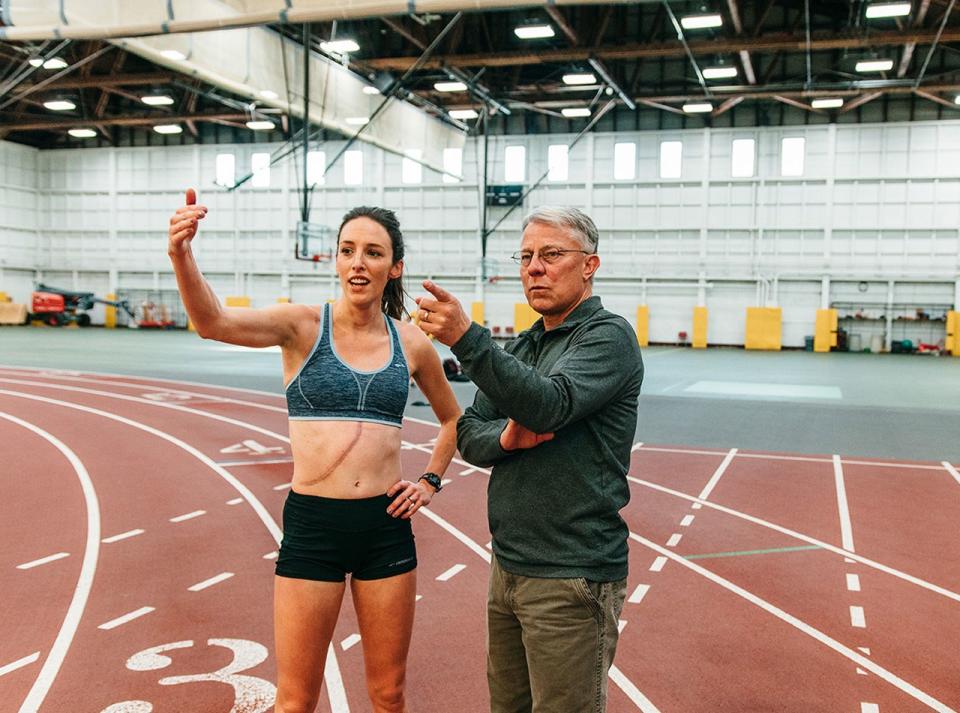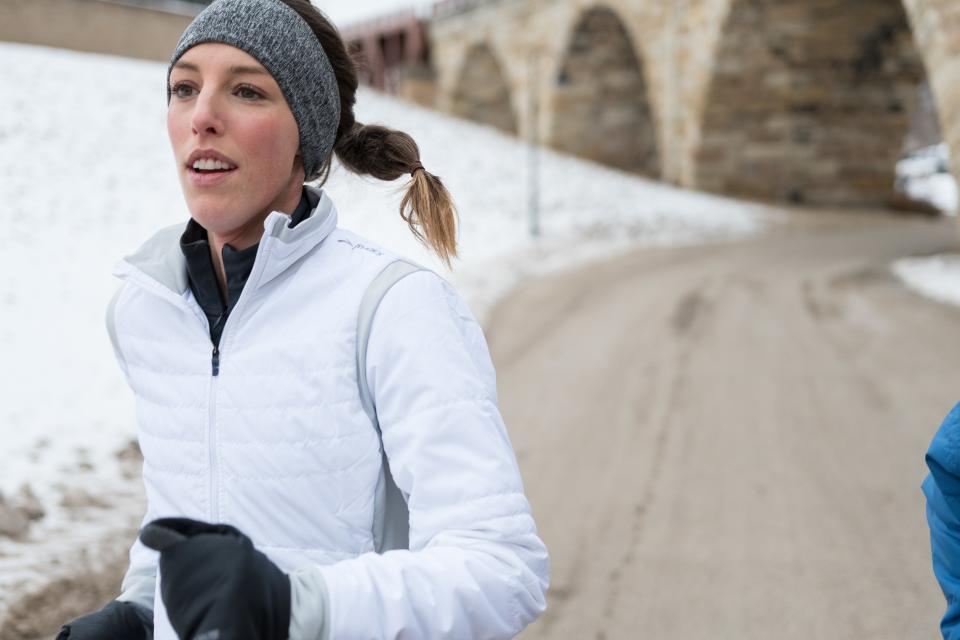After 4 Cancer Diagnoses in 8 Years, This Pro Racer Is Still Running
Since she began running in middle school, Gabriele “Gabe” Grunewald checked off numerous impressive accomplishments, including winning a track and field state title in the 800 meters in high school, becoming an NCAA All-American, placing fourth in the 2012 USA Olympic Trials, and nabbing a USA Championship title in the indoor 3,000 meters in 2014.
During many of these years, the 31-year-old was also battling cancer. Not just one diagnosis, but four in eight years, including a rare salivary gland cancer called adenoid cystic carcinoma. After each treatment and surgery, Grunewald returned to running as soon as she could. She now raises money for rare-cancer research and encourages other survivors to be active through her Brave Like Gabe Foundation.
SELF spoke with Grunewald to learn all the ways cancer has—and hasn't—changed her relationship with running. The following conversation has been edited and condensed for clarity.
SELF: How did you get into running in the first place?
Grunewald: I tried a bunch of different sports growing up. In middle school, I got into running socially with my friends. After trying cross-country and doing mile runs, I was hooked. It was a cool way for me to connect with friends, and I love spending time outside. I also love putting in the work and seeing the improvements, the delayed gratification from running and training and seeing how I can get stronger race by race.
SELF: You were still in college when you were first diagnosed with adenoid cystic carcinoma (ACC) in April 2009. What was your initial reaction when the doctor told you?
Grunewald: I was shocked. The only symptom was this tiny little bump under my ear that didn't go away over the course of a few months. My coaches wanted me to get it looked at. I was in the best shape of my life, 22, getting ready to finish college and start the next phase of my life. I felt completely healthy, I was running races. It came out of nowhere.

SELF: The next day you ran a personal best in the 1,500 meters. Did you have any fears about how the ACC would impact your running?
Grunewald: I had never heard of this cancer before—one of the first things I did was Google it. It was very scary. But what I came away realizing was that it was going to be a short-term inconvenience with running. I would have surgery and radiation that would interrupt my life, but it seemed I'd get back to running. The scary thing is that ACC often comes back later. I just tried to focus on one day at a time, and from there, one year at a time. I had to end that season [and have surgery to remove the tumor], but I knew I'd come back. It was inconvenient but not life-threatening, though it had the potential to be life-threatening. So I had a lot of things to think about.
SELF: After surgery and radiation, you got a waiver from the NCAA to run a sixth season. How did you feel then?
Grunewald: There was no evidence of the disease after treatment, although I knew it was not a cure. But I was good for now. I felt, 'No reason I can't go run and live my life.’
SELF: And that year, 2010, was one of your best seasons. But then doctors discovered papillary thyroid cancer in October. What was that emotional roller coaster like?
Grunewald: They found this while doing a follow-up scan from the previous cancer. I wasn't expecting to have anything come up. I had just had a really awesome year of running and just signed with Brooks. I expected to have a solid few years of life without any interruptions. It was hard for me—it seemed cruel to have another surgery so soon in my neck. I didn't think I would be a two-time cancer survivor at 24. It felt a little early to have another setback.
SELF: Did you use running to help you during this time?
Grunewald: Running couldn’t help [because I had to take a break for surgery], but I recovered from surgery quickly and tried to put it behind me as fast as possible to get back to my life. And between 2010 and 2016, I was living my life. I ran the international track circuit, was ranked high in the U.S. and and world, and got married. I was trying out for the 2016 Olympic Trials, and then a month later, doctors found a metastatic recurrence of the adenoid cystic carcinoma in my liver.
SELF: How hard was it to go from six years of success on the track to a third diagnosis?
Grunewald: I was horrified. It was a worst-case scenario. I definitely was not sure how much time I had left to live at that point. It was a sobering time. The tumor was the size of a softball, and I had run the trials with that and ran poorly. It was a tough summer. I didn't feel sick at all, I didn't have any symptoms. I knew ACC could come back, but my doctors and I hoped it wouldn't for a long period of time. You're never ready for stage IV cancer, but I certainly wasn't ready. I had planned to regroup to try the Olympic Trials in 2020 or have a kid and try again later. But there was no plan anymore after that.
SELF: Did you still run? How did that help or hurt?
Grunewald: I ran up until my surgery. Running helps me clear my mind and feel calm and not worry about such serious stuff for a while. Then the surgery required a 12- or 13-inch incision in my abdomen. I couldn't run. I tried a few times with mixed success. I would have loved to run, it would have been an easier time mentally and emotionally. Running is my preferred way to work through tough stuff in my life.
SELF: So what else did you do instead to help you emotionally and mentally?
Grunewald: I biked. I was spending time with friends and family, cooking, taking walks—relaxing things that aren't running. I put things on the calendar to look forward to, like a little travel here and there.

SELF: How long did it take you to finally get back to running? How did that feel?
Grunewald: After three-ish months I could run five miles in a row without stopping. At five miles, I felt like I could run again. I was really happy to be back running. I was really out of shape but grateful to be alive and grateful to run again. But it was also the start of a new journey to get my abdomen strong again and be a patient with advanced cancer. Running didn't take away all of the issues I was dealing with.
SELF: Only six months later, the ACC came back again, this time in the form of 12 small tumors on your liver. That's four diagnoses in eight years. How has all of this changed the way you look at running and your future in the sport?
Grunewald: I look at my running differently. It's something that's easy to take for granted when it's your job. It's such a big part of my life and identity. I haven't fully let go of my dreams of running fast on the track—I still raced last year. It's just a matter of my cancer cooperating. I feel both grateful to be able to get out there and driven as a professional to see what I can do and be one of the top Americans. I'm so happy I can still run—it's a way for me to connect with so many people, and helps me mentally and physically to deal with my symptoms.
SELF: What are your current running goals, and how have they changed?
Grunewald: I hope, deep down, I'll get an opening in the next couple years to get back to the track and run fast. I want to end my career on a note that's not predetermined by a cancer diagnosis. I have a hope and dream that maybe I can still have my moment on the track again. And that keeps me going. I'm not as greedy about what that means as I used to be. I ultimately want the chance to get back out there and see what I can do when I'm not on treatment or I'm on a treatment that allows me to run closer to my abilities.
SELF: You've been vocal about your experience. Why is it important to you to tell your story?
Grunewald: I always tried to be public and share my story. Especially in the last year and half as it got more serious, it was really meaningful to share my story. All rare cancers have a significant barrier to getting clinical trials and treatment; there is a lot less funding and research done. I thought there would be options for me, but that's not the case at all. There's not even a chemotherapy that works for ACC, it's off the beaten path for treatment. Anything I can do to use my story to help raise funds for research helps.

SELF: In addition to supporting rare cancer research, what are your other goals for the Brave Like Gabe Foundation?
Grunewald: I want to empower all cancer patients through physical activity, as running has been a huge part of my cancer journey. It keeps me moving forward, one step at a time, though all these diagnoses and treatments. Having a positive relationship with your body throughout the cancer experience is so important.
SELF: How can people support your work?
Grunewald: We're just getting started. We have a race next month—a Brave Like Gabe 5K in Minnesota with a virtual participation option. Funds raised will go to rare cancer research. My friends came up with “Brave Like Gabe” when doing crowdfunding for me. We're trying to encourage people to be brave in their own way, especially when they face adversity. It doesn't need to be cancer. I hope the Brave Like Gabe campaign makes people feel less alone. (Editor's note: Visit Brooks.com to dedicate your next run to Gabe.) There's also the Silo District Marathon in Waco, Texas, next month, and profits will go to rare cancer research.
SELF: How do you think your outlook right now would be different if you didn't run?
Grunewald: It's hard to imagine. I think it's given me purpose in my life and a road map where there is no finish line. It's helped me get through some of the toughest miles in my life. Some days I feel great, some days I don't. But I know that when I really don’t feel like going for a run, those are the days I need to get out there and run most. It helps me collect my thoughts and feel calm and try to put together something in life that makes sense. Running is such a gift. It's less about checking a workout off my list and more about being appreciative of the experience of being able to use my body in something positive that helps me move forward mentally and physically. Running is way for me to stay forward-oriented, and that's so important as a cancer patient.


